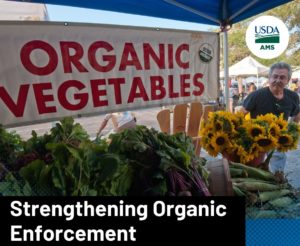Jan 18, 2023
USDA finalizes rule aimed at strengthening organic oversight
New federal guidelines designed to protect organic integrity are necessary to reinforce consumer confidence and to level the playing field for producers, industry insiders say.
The U.S. Department of Agriculture on Wednesday previewed the Strengthening Organic Enforcement final rule, which will become part of the federal register on Thursday. The update to USDA organic regulations strengthens oversight and enforcement of the production, handling, and sale of organic products and implements mandates from the 2018 Farm Bill as well as recommendations from the National Organic Standards Board.

“This rule is the most significant change to the U.S. Department of Agriculture’s organic regulations since the National Organic Program was established in 2001,” Jenny Lester Moffitt, USA under secretary for marketing and regulatory programs, said during a conference call with media. “This is a momentous occasion.”
The rule requires certification of more businesses, such as brokers and traders, at critical links in organic supply chains and as well as National Organic Program import certificates for all organic imports. It also increases authority for more rigorous on-site inspections, including unannounced inspections, and mandates uniform qualification and training standards for organic inspectors and certifying agents.
U.S. Rep Chellie Pingree, who has represented Maine’s 1st congressional district since 2009, has been involved with organic issues since the origin of the Maine Organic Farmers and Gardeners Association in the 1970s. Pingree said the SOE “has been a long time coming” and will help a $60 billion industry be more transparent.
“We’ve learned during the pandemic that the challenges that we face with our supply chain issues, which were widespread throughout agriculture, were exacerbated in organic agriculture and allowed for even more opportunities for fraudulent products to come through the market because of the desperate need for product everywhere,” Pingree said. “That makes this even more important than ever.”
Moffitt said SOE supports a suite of action taken by the USDA to protect the organic label, including the registration of the USDA organic seal trademark last month with the U.S. Patent and Trademark Office.
“The industry will benefit from these stronger tools,” she said. “I know this as someone who ran my family’s organic farm for 10 years — and certainly my parents still own that operation – how important it is for producers to be operating on the same level playing field that we’re all expecting.”
The Organic Trade Association applauded SOE, saying in a statement: “This regulation will have significant and far-reaching impacts on the organic sector and will do much to deter and detect organic fraud and protect organic integrity throughout the supply chain.”
Pingree, a certified organic farmer, hears from colleagues about the challenges of complying with the program, including soaring input costs such as organic feed for animals.
“You need to be richly rewarded” for that effort, she said, while at the same time, “consumers need to know that if they’re going to put the money down that they’re actually going to get the product that they’re intending to get.
“It is not an easy standard to meet, and it shouldn’t be, and we should keep it that way.”
After the USDA published an SOE draft in 2020, Moffitt said the agency received more than 15,000 comments. She said the final rule responds to industry requests and concerns in that feedback.
“Organic fresh produce is highly valued by many consumers, and we hope this new rule allows for continued growth of the organic fresh produce industry while maintaining consumer trust in the USDA organic seal,” Emily Griep, vice president of regulatory compliance and global food safety standards at the International Fresh Produce Association, said in a statement. “IFPA is committed to working with the USDA NOP to help our members understand and comply with the requirements of the final rule, particularly organic produce importers who will be most impacted by the rule.”
There will be a two-month period until the rule becomes fully effective, followed by a 12-month implementation period, said Jennifer Tucker, USDA deputy administrator for the National Organic Program. Compliance will begin in March 2024.
“We are ready to go as a program in having the appropriate staff and resources to oversee this rule, once implemented, and to help certifiers implement it over the next 14 months,” Tucker said.
A fact sheet on the final rule is available online.
“There are many reasons why people pick organic,” Tucker said. “Our job is to help explain what those standards are so people can make that choice.”









